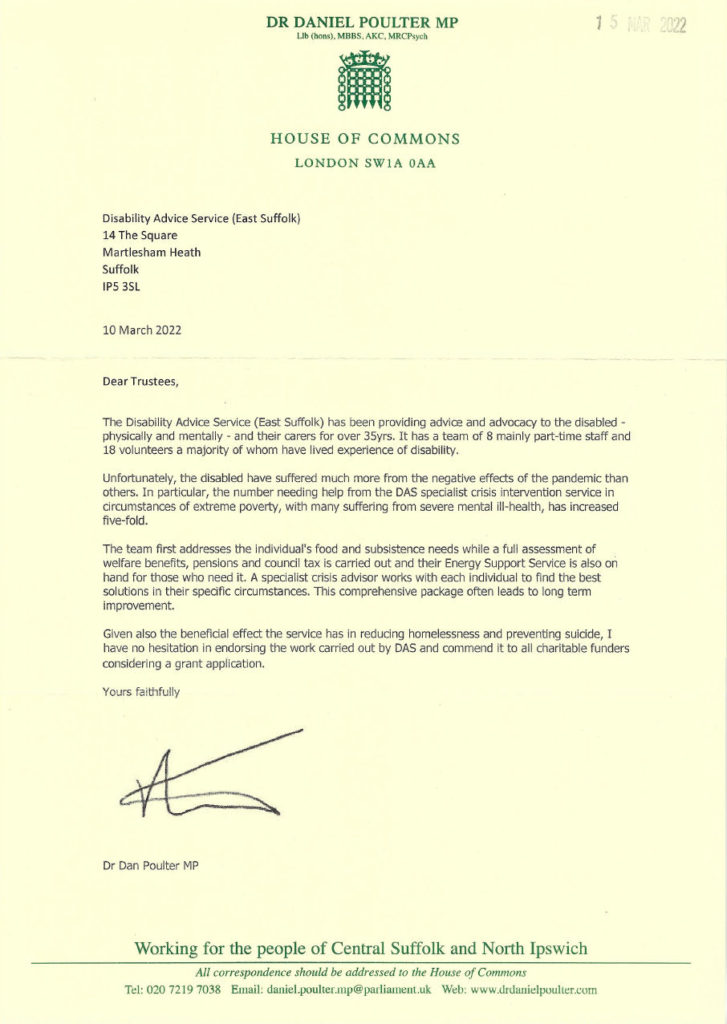In “The (Uncomfortable) Truth About Disability” we explain:
- research that shows the disabled face a higher cost of living and are twice as likely to be unemployed;
- the number of ill and disabled people becoming homeless surged by 53% in 2019;
- research that shows the disabled are more than twice as likely to experience some form of domestic abuse than non-disabled victims and that they also suffer more severe and frequent abuse over longer periods of time; and
- how the pandemic has disproportionately affected the disabled with the risk of Covid death having been more than 3 times greater for the more-disabled compared with non-disabled.
With that background, improving our clients’ general sense of well-being and by extension preventing suicide for the most vulnerable is a core intention behind DAS’s crisis intervention programme.
Causes of suicidal feelings
Of the 17 most common causes of suicidal feelings listed by Mind, ten can have a direct relevance to the disabled and the potential for accumulation increases their risk level considerably:
- mental health problems
- bullying or discrimination
- different types of abuse, including domestic, sexual or physical abuse
- long-term physical pain or illness
- money problems
- housing problems, including homelessness
- isolation or loneliness
- feeling inadequate or a failure
- addiction or substance abuse
- other forms of trauma.
“People living in the most disadvantaged communities face the highest risk of dying by suicide.” So says the Samaritans charity. In the foreword to its 2017 report “Dying from inequality: Socioeconomic disadvantage and suicidal behaviour”, Ruth Sutherland, the Samaritans CEO commented:
“Living in poverty shouldn’t mean losing your life. Going through difficult times, like losing your job or being in debt, shouldn’t mean not wanting to live. But that is what’s happening in the UK and Ireland today. Suicide is killing the most disadvantaged and vulnerable people, devastating families and communities.”
The influence of disability on suicidal behaviour
Important research was published in December 2011 carried out by senior personnel representing: Department of Health Sciences, College of Medicine, Biological Sciences and Psychology, University of Leicester, The School of Medicine, Swansea University and several other academic institutions.
A random probability sample comprising 7,461 respondents were interviewed throughout 2007 for the third national survey of psychiatric morbidity of adults in England. About one in every 150 adults in England had made a suicide attempt in the past 12 months. “Those with some form of disability were four times more likely to have attempted suicide after adjusting for significant socio demo-graphic and socio economic correlates. Difficulty in managing ones financial affairs (budgeting and paying bills) and dealing with paperwork (writing letters and filling in forms) appear to have a greater influence on the likelihood of suicide attempts than difficulties in carrying out personal care, practical or household activities.”
Greater likelihood of self-harm in the disabled
According to VeryWellMnd, self-injury is the act of hurting one’s body without the intention of suicide. While self-injury is an entirely distinct behavior from suicide, it is often seen as a red flag warning of persons who may likely attempt suicide at a later date.
Non-suicidal self-injury can take many different forms including cutting, burning, scratching, abrasion, punching, and headbanging. More severe cases have involved bone-breaking, self-amputation, and permanent eye damage.
Self-injury is a symptom associated with different forms of psychiatric illness, including major depressive cycles of bipolar disorder. Other causes include borderline personality disorder, eating disorders, and dissociative disorders.
From this research published in October 2019 by the Disability and Health Journal: “UK adolescents with a disability reported markedly higher levels of emotion difficulties and self-harm than their peers.”
The causal link between suicide and loss of welfare benefits
The loss of or reduction of an individual’s welfare benefits is recognised as a significant factor in driving those concerned into extreme poverty and worse. Reporting on the second Channel 4 Dispatches programme mentioned below Citizen Network commented here: “…we know from the ONS that the total number of suicides per year is roughly 6,000. Which means the total number of suicides since the beginning of the welfare reform period (2008-2022) is going to be roughly around 85,000. It is very likely that the DWP has contributed to a significant number of these suicides. In addition, the DWP’s inadequate and brutal benefit system has contributed to many other unnecessary deaths from illness, malnutrition, cold and social isolation.”
Channel 4 TV’s Dispatches covered this subject in two programmes 2018 and again in 2021. In conjunction with the latter, the presenter explained that as there is such a paucity of data on the subject Channel 4 had decided to conduct its own survey. 3,500 replied with the following results also reported by Citizen Network:
- 61% said the way the system worked had caused them to have suicidal thoughts.
- 32% said the DWP system had caused them to plan suicide.
- 13% (451) said they had attempted suicide as a result of interacting with the DWP.
- 96% found the preparation for their assessment distressing.
- 89% said the system had aggravated their pre-existing conditions.
- 93% said the process of claiming benefits had made their mental health worse.
- 79% said the system had made their physical health worse.
The programme also reported that between: 2008-2020, 82 deaths were linked to benefits had been reported in the media; and between 2012-2021, 268 secret reviews about claimants were carried out by the DWP who had come to serious harm, these are never made public.
There are 1,600+ recorded comments on the YouTube video of the programme, not one of them positive and with this one quite typical:
“I know how these people feel, I have MS and mental health problems plus other problems. Applying for PIP and any other benefits is a nightmare, you are treated so inhumanely, made to feel worthless and they come across as not believing a word you or your doctors say. We don’t ask to be disabled its the hand we have been dealt and we’re trying our best to live life the best we can.”
In early 2020 the National Audit Office (NAO) undertook an investigation after the former MP Frank Field – at the time the chair of the work and pensions select committee – wrote to it to complain that the Department of Work & Pensions (DWP) had blocked his requests for data on suicide-related deaths. (This was on the grounds that to gather the information would be too expensive.)
Their report published on 6 February 2020 revealed that information held by the DWP showed that its own Departmental Internal Process Reviews (IPRs) since 2014‑15 evidenced 69 cases related to suicide. NAO commented: “It is highly unlikely that the 69 cases the Department has investigated represents the number of cases it could have investigated in the past six years.” adding “…the Department does not have a robust record of cases investigated before 2014-15”. In fact, Disability Rights UK reported on 27 February 2020 that reviews of 50 deaths following the loss of social security payments before 2015 had been shredded with officials blaming data protection laws. “The data watchdog said there was no requirement to destroy the reports by any particular date and that a “public interest” exemption could have been used.”
The impact of DAS’s work
The research cited above by the most respected authorities in the UK on such matters shows there is a direct causal link between disability, financial hardship brought on by the welfare benefits system and extreme poverty, malnutrition, unnecessary deaths and suicide or self harm. It follows that the work we undertake has a direct impact in preventing suicide by:
- treating our crisis clients with compassion and in a non-judgemental way;
- effecting short-term relief to their immediate food and short-term financial sustenance problems;
- tackling systemic causes of their financial difficulties by helping them contest DWP decisions and getting them relief from Council Tax, Water Rates and other expenditure; and
- reversing their experience of spiralling despair, providing an immediate uplift and boosting their confidence for the future.
For details of how the crisis programme works see this explanatory report.
The beneficial impact of our work in suicide prevention has been endorsed by Dr Daniel Poulter, MP for Central Suffolk and North Ipswich and a practicing medic with a special interest in mental health.

